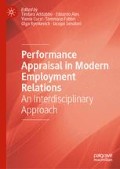Abstract
The author’s intent to assess the right to lie as a measure guaranteed to the worker for the purposes of effective protection of privacy within the employment relationships. The chapter deliberates whether the worker may refer to the right to lie based on the concept of the right to self-defence and in the situations when the action of the employer interferes with the sphere of their privacy (also in the light of the use of the new technologies), may use the untruth in relation to the employer. It was also crucial to decide whether the right to lie should be granted to all persons performing work to the same extent (subordinated or independent work) and when the worker may use the right to lie and in what cases it will be possible to decide that such action is necessary. The chapter presents also possible actions of the worker telling the untruth through the prism of the proportionality principle and determination of the effects of the employer learning about the lie of the worker in the context of agreement termination.
Access this chapter
Tax calculation will be finalised at checkout
Purchases are for personal use only
References
Barański, Michał, and Giermak Maciej. 2017. “Protection of Employees’ Geolocation Data in EU Law.” In Earth Observation & Navigation. Law and Technology, edited by Marlena Jankowska, Mirosław Pawełczyk, Sławomir Augustyn, and Marcin Kulawiak. Warsaw: Geo&IP Series.
Bloustein, Edward J. 1964. “Privacy as an Aspect of Human Dignity: An Answer to Dean Prosser.” N.Y.U. Law Review 39: 962–1007.
Degener, Udo. 1975. Das Fragerecht des Arbeitgebers gegenüber Bewerbern. Berlin: Duncker & Humblot.
Drozd, Andrzej. 2003. “O dopuszczalności wykorzystania wariografu w stosunkach pracy.” Praca i Zabezpieczenie Społeczne, 4.
Drozd, Andrzej. 2004. Prawo podmiotu zatrudniającego do pozyskiwania informacji o kandydacie na pracownika. Warszawa: LexisNexis Polska.
Fried, Charles. 1968. “Privacy.” The Yale Law Journal 77: 475–493.
Fromm, Erich. 1996. Rewolucja nadziei [The Revolution of Hope]. Poznań: REBIS.
Kopff, Andrzej. 1972. “Koncepcja prawa do intymności i do prywatności życia osobistego (zagadnienia konstrukcyjne).” Studia Cywilistyczne, XX.
Kuba, Magdalena. 2014. Prawne formy kontroli pracownika w miejscu pracy. LEX-el.
Otto, Marta. 2016. The Right to Privacy in Employment: A Comparative Analysis. Oxford, Portland, Oregon: Hart Publishing.
Puwalski, Marek. 2003. Prawo do prywatności osób publicznych. Toruń: Dom Organizatora.
Rodríguez-Ruiz, Blanca. 1997. Privacy in Telecommunications: A European and an American Approach. Boston: Kluwer Law International.
Scoglio, Stefano. 1998. Transforming Privacy: A Transpersonal Philosophy of Rights. London: Greenwood Publishing Group.
Szymorek, Karolina. 2012. “Aspekty prawne kontrolowania pracowników za pomocą technologii identyfikacji radiowej (RFID).” Monitor Prawa Pracy, 10.
Turnbull, Ian J. 2009. Privacy in a Workplace. Toronto: CCH Canadian Limited.
Turowski, Jan. 1992. “Dychotomia „prywatności” i „publiczności” jako teoretyczna rama analizy rzeczywistości społecznej.” In Prywatność i życie publiczne w nowoczesnym społeczeństwie USA-Polska, edited by Leon Dyczewski, John Kromkowski, and George F. McLean. Lublin: Tow. Nauk. KUL.
Westin, Alan F. 1967. Privacy and Freedom. New York: Athenum.
Wild, Mikołaj. 2001. “Ochrona prywatności w prawie cywilnym. (Koncepcja sfer a prawo podmiotowe).” Państwo i Prawo, 4.
Working Party 29 Opinion on the Use of Location Data with a View to Providing Value-Added Services. http://ec.europa.eu/justice/policies/privacy/docs/wpdocs/2005/wp115_en.pdf. Accessed on February 18, 2019.
Wujczyk, Marcin. 2012. Prawo pracownika do ochrony prywatności. Warszawa: Wolters Kluwer.
Zaleski, Zbigniew. 2001. “Prawo do prywatności – aspekty psychologiczne.” In Prawo do prywatności. Aspekty prawne i psychologiczne, edited by Krzysztof Motyka. Lublin: Verba.
Author information
Authors and Affiliations
Corresponding author
Editor information
Editors and Affiliations
Rights and permissions
Copyright information
© 2020 The Author(s)
About this chapter
Cite this chapter
Florczak, I., Wujczyk, M. (2020). The Lie as a Privacy Protection Measure. In: Addabbo, T., Ales, E., Curzi, Y., Fabbri, T., Rymkevich, O., Senatori, I. (eds) Performance Appraisal in Modern Employment Relations. Palgrave Macmillan, Cham. https://doi.org/10.1007/978-3-030-26538-0_7
Download citation
DOI: https://doi.org/10.1007/978-3-030-26538-0_7
Published:
Publisher Name: Palgrave Macmillan, Cham
Print ISBN: 978-3-030-26537-3
Online ISBN: 978-3-030-26538-0
eBook Packages: Business and ManagementBusiness and Management (R0)

